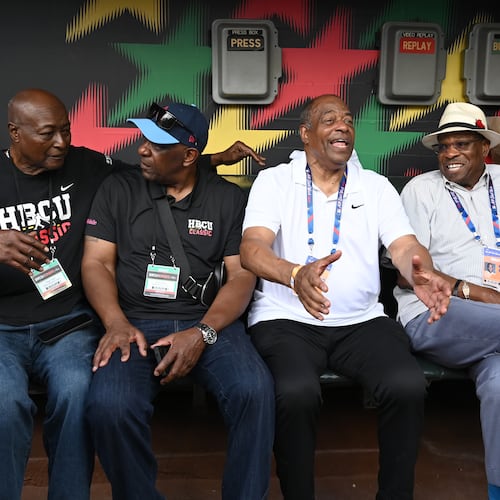Right place, right time, right people.
The stars aligned on a hot July night in 1999, when a former Metro Atlanta Chamber (of commerce) president Gerald “Jerry” Bartels and his grandsons, rabid baseball fans all, headed to New York for a Yankees-Montreal Expos game. Former Yankees catcher Yogi Berra was honored that day. Don Larson, a Yankees pitcher who’d turned in a perfect game in the 1956 World Series, threw out the ceremonial first pitch to ex-catcher Berra.
Then — what were the odds — Yankees hurler David Cone pitched a perfect game as well. At that time, it was only the 16th in Major League Baseball history.
Afterwards, said grandson Hunter Reid, “We took a cab back into the city and walked into a bar and told people Cone had thrown a perfect game. This was before smartphones and social media, and people in the bar were like ‘You rednecks from South Carolina and Georgia, get out of here. You’re making up stories.’”
It was far from the first “right place” moment for Bartels. Far from the first time he’d faced skeptics or that an athletic event had become an inflection point in his life.
The veteran business executive helmed the Atlanta chamber from 1983 to 1996 and declared early in his tenure that Atlanta could be “the sports capital of the world.” More than few in the business and sports communities and the public at large snorted.
That was before he chalked up a string of accomplishments that included getting the failing Peach Bowl’s legs back under it and playing a key role in Atlanta’s capturing the 1996 Centennial Olympic Games.
Jerry Bartels, who strove for excellence and relished both cooperation and competition, died of complications of old age May 8. He was 91. Bartels is survived by his wife Sara, daughter Jeri (Lee) Bartels Blair, stepsons William, Robert and Michael (Dawn) Kimber, daughter-in-law Janice Kimber and grandchildren and great-grandchildren.
He could be stubborn as a mule, said a relative.
As grandson Kelsey Reid recalled, “If our grandfather decided he was going to do something, come hell or high water he did it.”
And yes, that included the somewhat unusual detour into the sporting world.
Seeing sports as more than just entertainment, “He recognized that sports generates revenue for the community and promotion and publicity all over the world,” said Charles Van Rysselberge, a retired longtime chamber executive who worked under Bartels.
Bartels helped nudge a somewhat skeptical business community into supporting Atlanta’s bid in North America then internationally to land the 1996 Olympics. He orchestrated financial support for Billy Payne’s group, including the Chamber’s kicking in $175,000 to get the ball rolling. Then, Bartels helped raise hundreds of thousands of dollars in the international campaign, said Van Rysselberge.
The chamber exec was also well-positioned to help stave off the demise of the virtually bankrupt Peach Bowl. The chamber made the game a division of its organization in 1986, with head of the bowl Bennett Brown saying “Okay, Bartels, but you’ll just preside over its funeral.”
Funeral? To the contrary, the Chick-fil-A Peach Bowl is now a perennial sellout and a significant part of the college football playoffs.
Bartels’ personality and skill set were a natural fit in promoting such initiatives, said Van Rysselberge.
He recalled that “When you’d go to conferences for chamber of commerce executives, you’d see people just gravitate to him, looking for advice and suggestions. He really was an outstanding manager.”
Friends knew him as a thoughtful visionary who engaged with disparate voices and had a knack for organizing them into a smoothly functioning team.
“He was a credible leader and he did his homework,” said former Central Atlanta Progress head Sam Williams, who labeled him “a leader during a big period in Atlanta’s history.”
Bartels not only left deep cleat marks on the city’s sporting life but also increased the reach and clout of the chamber.
On his watch, membership more than doubled from 3,000 to about 8,000 and the organization’s revenue increased tenfold. The pace of foreign trade missions stepped up with then-mayor Andrew Young acting as point man to successfully lure international business.
Bartels’ indefatigable work ethic, coupled with his drive for excellence and desire to win also showed up in his family life, said his grandsons.
He had a pool table in his house, said Hunter Reid. “He loved to get us and teach us how to shoot pool, and how to set up that next shot. But he came from a generation where you don’t let kids win. We had to wait until he got older before we could beat him.”
About the Author
Keep Reading
The Latest
Featured



